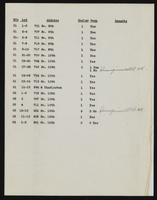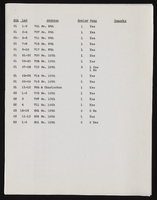Search the Special Collections and Archives Portal
Search Results

Interview with Bennie Reilley, Sr., May 10, 2004
Date
Archival Collection
Description
Access note: May not quote in any form without written permission from interviewee
Text
master plans (orthographic projections)
overall plans, usually graphic and drawn on a small scale, into which the details of other specific plans are fitted. A master plan is frequently supplemented by written material. For plans having to do with land use control law, zoning, and urban redevelopment used to describe the omnibus plans of cities or towns for housing, industry, commercial, and recreational facilities and their impact on environmental factors, use "comprehensive plans"
Authority Sources
Material Type

José Armando Elique interview, January 14, 2019: transcript
Date
Archival Collection
Description
José Armando Elique was born on February 14, 1944 in New York City. Born to Puerto Rican parents that immigrated to the United States in the 20s, Elique spent his childhood in both New York and Puerto Rico. Raised in the South Bronx, Elique’s family were part of the first pioneros from Puerto Ricans to settle in New York City in the twentieth century. Elique served as a radar man in the United States Navy during the Vietnam War on the USS Purdey. After his service, Elique applied to the Port Authority Police Department where his first big assignment included going undercover and investigating gang activity. Over the course of the next 22 years, he rose through the rankings becoming the assistant chief in charge of overseeing six facilities in the region. Elique is the first and only Latino to reach such rank with the Port Authority. Elique moved to Nevada in 2000 and became the chief of UNLV Police Services. Prior to coming to UNLV, he served as the University Director of Public Safety for the City University of New York (CUNY). Elique is also a member of the National Latino Police Officers Association, an organization that helps train Latino officers on contemporary issues and promote the advancement of Latinos in the police force. As police chief, Elique has fought for the hiring of new police officers to better serve UNLV’s campus and student body. As Chief of Police, Elique oversaw the response of his team to secure the campus and to provide for the needs of those seeking refuge at Thomas and Mack Center on the night of October 1, 2017. Chief Elique is also part of the Remembering 1 October oral history project where he reflected on that night, the role of campus police, coordination with Metro Police, purpose of the Fusion Center, command post, Emergency Operation Center for business continuity, and preparedness of urgent situation and active shooters. He is a graduate of Adelphi University and of Northwestern University’s Traffic Institute of Police Administration and the Police Executive Research Forum’s Senior Management Institute for Police.
Text

Interview with Stuart C. Black, January 18, 2005
Date
Archival Collection
Description
Text

Interview with Lewis Gibson Miller, September 14, 2005
Date
Archival Collection
Description
Text





